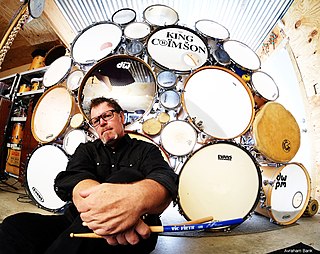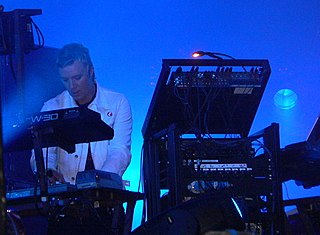A Quote by Pat Mastelotto
I think basically lables were more interested in a Richard Page record than a Mr. Mister record.
Related Quotes
The first record was basically a quick, fast record. The second record, we were going for more of a poppier sound - like a heavy pop sound. For 'Rocket to Russia,' we'd sort of reached our pinnacle. We'd gotten really good at what we were doing, so that's like my favorite record - that's a really good record. It's just great from beginning to end.
My record label, which is a huge record label who represents massive, massive stars - they've never done anything like this before, and they were so excited about this idea of an animated character which is singing legitimate music. It's not a comedy record, it's a legitimate record. And they really jumped on board. So, we've got our Facebook page up, we'll be jumping on Twitter very soon, and sort of be creating Haley outside of American Dad.
Al Gore wanted to tell people what they could listen to and what they couldn't, what they could record. It was basically coming down to the idea that he wouldn't let anybody record any music that he didn't think you should be doing. There was going to be an organization that would tell you what you could and couldn't record.
I call it "being interrupted by success." We had done The Soft Bulletin, which came out in 1999, and we knew we that were gonna make another record before too long. But in between this, we were still in this mode of kind of just - not re-creating what we could be, but kind of doing different things. For the longest time in the Flaming Lips we were like, "Make a record, go on tour. Come back, make another record," and you know, I think, frankly, we were kind of like, "There's more to life than just recording records and going on tour."
I think it's stripped down as far as electronics go, but we just wanted to write a record that we felt better represented how we sound live with more of a rock feel, which is the direction we've been heading. It's just an evolution of the band throughout the years. We worked on this record longer than any other record, so I don't know if "stripped down" is how I would put it; I think it is a little bit more raw sounding.
Jesus was not famous in his day. If there were no Bible, there would have been no record of him. The record belongs to his four disciples; nobody else has ever mentioned him, whether he existed or not. He was not famous. He was not successful. Can you think of a greater failure than Jesus? But, by and by, he became more and more significant; by and by, people recognized him. It takes time.
When I was growing up, my mother would always say, 'It will go on your permanent record.' There was no 'permanent record.' If there were a 'permanent record,' I'd never be able to be a lawyer. I was such a bum, in elementary school and high school... There is a permanent record today and it's called the Internet.
When I was growing up, my mother would always say, 'It will go on your permanent record.' There was no 'permanent record.' If there were a 'permanent record,' I'd never be able to be a lawyer. I was such a bum in elementary school and high school... There is a permanent record today, and it's called the Internet.



































